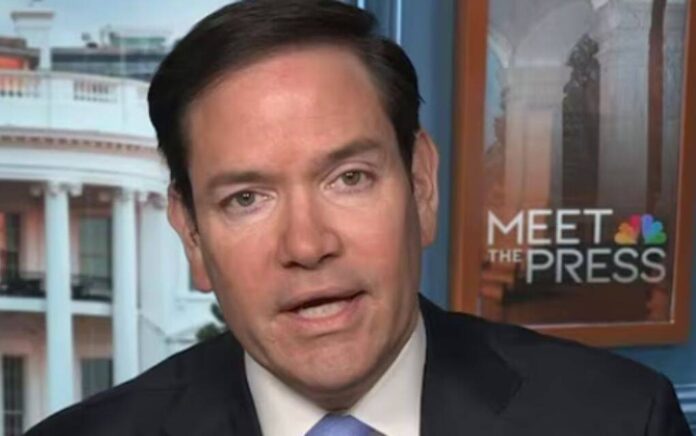
The Trump admin is under immense pressure. The question is whether they will cave.
And now the Secretary of State has gone on MSNBC to come clean about this hot issue.
Deportation Policy Targets Illegal Immigrants, Not U.S. Citizen Children Says Secretary of State
The Trump administration is once again at the center of a media firestorm, this time over the deportation of illegal immigrant mothers from Honduras, whose U.S. citizen children accompanied them. Secretary of State Marco Rubio took to the airwaves Sunday to set the record straight, pushing back against what he called sensationalized and misleading reports. The controversy, fueled by pro-immigration activists and anti-Trump voices, has sparked a heated debate about the administration’s immigration policies. Yet, Rubio’s remarks reveal a commitment to enforcing the law while navigating the complexities of family dynamics in deportation cases.
On NBC News’ “Meet the Press,” Rubio addressed host Kristen Welker with clarity and conviction, dismantling the narrative spun by several media outlets. “On the headline, that’s a misleading headline,” Rubio said. “Three U.S. citizens ages 4, 7 and 2 were not deported. Their mothers who were illegally in this country were deported. The children went with their mothers. The children are U.S. citizens, they can come back into the United States if their father, or someone here, wants to assume them. But, ultimately who was deported was their mothers who were here illegally. The children just went with their mothers. It’s not like, you guys make it sound like ICE agents kicked down the door and grabbed the 2-year-old and threw him on an airplane. That’s misleading. That’s just not true.” His words cut through the fog of outrage, emphasizing that the administration’s actions targeted only those who broke immigration laws.
The furor began when Immigration and Customs Enforcement (ICE) deported the mothers of three U.S. citizen children, aged 7, 4, and 2. Outlets like The Associated Press, The Washington Post, The Guardian, and NPR ran headlines claiming the Trump administration had deported U.S. citizens, igniting a wave of criticism from left-leaning activists. These reports painted a dire picture, with one family lawyer alleging that the 4-year-old, who reportedly suffers from Stage 4 cancer, boarded a deportation flight without medication or access to a doctor. Such claims have fueled accusations of heartlessness, but Rubio’s response suggests a more nuanced reality: the mothers, not the children, were the focus of the deportation orders.
Rubio was quick to point out the media’s double standards. He argued that if the administration had forced the children to remain in the U.S. while deporting their mothers, the same outlets would have accused the government of tearing families apart or holding children “hostage.” “If someone is in this country unlawfully, illegally, that person gets deported,” Rubio continued.
“If that person is with a 2-year-old child or has a 2-year-old child says ‘I want to take my child with me,’ well then you have two choices. You can say, ‘yes, of course you can take your child whether they’re a citizen or not because it’s your child,’ or you can say, ‘yes, you can go. But your child must stay behind.’ And then your headlines would read, ‘U.S. holding hostage [a] 2-year-old, 4-year-old, 7-year-old, while mother deported.’ So, the parents make that choice.” This perspective frames the administration’s policy as one that respects parental decisions while upholding the rule of law.
The Trump administration’s approach to immigration has consistently prioritized enforcement, a stance that resonates with millions of Americans who believe in secure borders and legal pathways to citizenship. President Donald Trump’s executive order on January 20, his first day back in office, aimed to end birthright citizenship for children born to illegal immigrants with only temporary legal status.
Though a federal judge struck down the order, the case now awaits deliberation by the U.S. Supreme Court, signaling the administration’s determination to tackle what it sees as loopholes in the immigration system. Supporters argue that such measures are necessary to deter illegal immigration and protect national sovereignty.
Critics, however, have seized on the deportations to paint the administration as callous and constitutionally reckless. Democrats and left-wing pundits have raised alarms about the potential deportation of U.S. citizens, a move that would violate the 14th Amendment, which guarantees citizenship to all individuals born on U.S. soil. These fears, while rooted in distrust of Trump’s agenda, appear exaggerated in light of Rubio’s clarification that the children in question were not deported but chose to accompany their mothers. The administration’s defenders argue that such accusations are part of a broader effort to vilify Trump’s immigration policies without engaging with their legal and practical merits.
The controversy has also drawn attention to specific cases, such as that of Kilmar Abrego Garcia, an alleged MS-13 gang member deported to El Salvador in March. Four congressional Democrats, joined by Maryland Senator Chris Van Hollen, traveled to El Salvador to meet with Garcia, accusing the administration of bypassing due process in his deportation.
Such actions by Democrats suggest a willingness to defend even those with criminal affiliations, a move that critics say undermines public safety and the rule of law. The Trump administration, by contrast, has made clear its intent to prioritize the removal of individuals who pose a threat to communities, whether through gang activity or illegal presence.
For supporters of the president, the media’s portrayal of the recent deportations is yet another example of biased reporting aimed at discrediting a leader who dares to enforce immigration laws. The administration’s policies, they argue, are not about cruelty but about restoring order to a system that has been exploited for decades. By allowing the children to remain with their mothers, ICE demonstrated a pragmatic approach, avoiding the trauma of separation while ensuring that illegal immigrants face consequences. The children, as U.S. citizens, retain the right to return, a fact that Rubio emphasized to counter claims of inhumanity.
As the Supreme Court prepares to weigh in on Trump’s executive order and the nation grapples with the complexities of immigration policy, the administration remains steadfast. Rubio’s remarks serve as a reminder that enforcing the law does not equate to heartlessness, and parental choice plays a significant role in these cases. For Trump and his supporters, the path forward is clear: secure the border, uphold the law, and protect the nation’s sovereignty, all while navigating the human elements with care. The media may continue to spin its narratives, but the administration’s focus on clarity and enforcement signals a commitment to putting America first.
The Federalist Wire will update you on any further immigration news from the Trump administration.



















